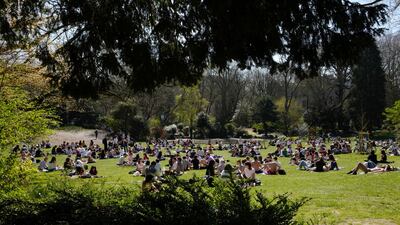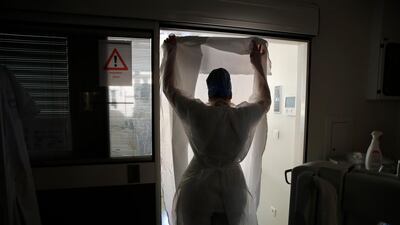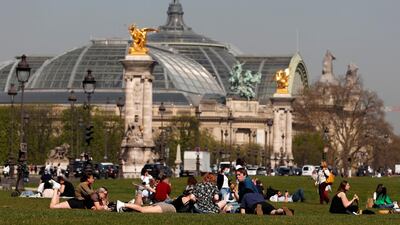French President Emmanuel Macron is under fire after admitting he waited until the last minute to put the country into lockdown as a third wave of Covid-19 infection sweeps Europe.
Mr Macron on Wednesday announced all schools are to close for at least three weeks and travel within the country would be banned for a month after Easter to arrest a surge in case numbers that could overwhelm hospitals.
The president said that from Saturday, non-essential shops will close, a 7pm curfew would apply across the country and home-working would become compulsory.
"We will lose control if we do not move now," Mr Macron told the French nation in a televised address.
“We did everything we could to make these decisions as late as possible, when they became strictly necessary. That is now.”
The French lockdown came as a top European Union official said "zero" shots would be exported to Britain if AstraZeneca failed to meet commitments made to the bloc.
Thierry Breton, internal market commissioner, said there was "nothing to negotiate" between the UK and EU on vaccine supplies.
"If [AstraZeneca] does more, we don't have any issue, but as long as it doesn't deliver its commitment to us, the doses stay in Europe — except for Covax," he said, referring to the World Health Organisation scheme for poorer countries. "There is no negotiation."
The WHO on Thursday criticised Europe for its sluggish vaccination programme, while drugmaker Pfizer warned that export controls imposed by the EU were a burden that was creating uncertainty over output.
Mr Macron vowed France would ramp up its inoculation campaign as the country was “in a race” to suppress the more contagious variant of the virus first identified in England.
But he stopped short of demanding that people stay in their homes or avoid socialising completely, allowing movement between regions over the Easter weekend.
He said that the government waited “until the last moment” to impose further restrictions.
“We gained precious weeks of liberty, weeks of learning for our children, we allowed hundreds of thousands of workers to keep their head above water, without losing control of the epidemic," he said.
"We have adopted a strategy since the beginning of the year that aims to contain the epidemic without shutting ourselves in.”
But doctors said restrictions should have been enforced sooner.
Daily infections in France have doubled since February to nearly 40,000, while the number of Covid-19 patients in intensive care reached 5,000 this week, exceeding the peak during a six-week lockdown late last year.
The death toll is rising, averaging nearly 350 a day over the past seven days compared to about 250 last week.
The French hospital federation last week warned that wards across the country were facing an "unprecedented violent shock" in the coming weeks if authorities were unable to curb the rise in case numbers.
Gilles Pialoux, head of infectious diseases at the Tenon hospital in Paris, said the country was in a prolonged fight against the virus.
"We've lost so much time that the measures now will be harder and last for longer," he said
Hospital staff were "tired of being tired", he said.
Hospital directors previously warned authorities they would need to make difficult decisions in the coming weeks over which patients receive intensive care in the event of a shortage of beds.
Mr Macron announced an additional 3,000 intensive care beds in the hardest-hit regions, bringing the total to about 10,000.
Romain Beal, a blood oxygen specialist at the Amiens-Picardie Hospital, said the epidemic was starting to affect younger and healthier people.
“We feel this wave coming very strongly,” he said. “We had families where we had the mother and her son die at the same time in two different ICU rooms here. It’s unbearable.”
Health Minister Olivier Veran said the number of new Covid-19 cases could peak in the next seven to 10 days, while the peak in intensive care admissions could be seen by the end of the month.
French Prime Minister Jean Castex warned on Thursday that police would get tougher on people who were breaking the rules.
He said prosecutors should systematically crack down on organisers of clandestine parties for putting lives in danger.
Mr Macron acknowledged that mistakes had been made in the government’s response to the pandemic.
“At every stage of this epidemic, we could say to ourselves that we could have done better,” he said. “But I know one thing: we have stood firm, we’ve learned and at every stage we’ve improved.”
He said that France’s inoculation drive was “the way out of the crisis” and the country would “vaccinate, vaccinate, vaccinate” in the weeks ahead.
After a disastrous start, the campaign is gathering pace, with 350,000-400,000 shots administered per day.
He said the April lockdown and swifter distribution of vaccines could allow some businesses, such as museums and outdoor dining venues, to reopen by mid-May.
“If we organise ourselves in the next months, then we will see the end of the tunnel and we will find our way back,” he said.
Mr Macron was seeking to avoid a third large-scale lockdown since the start of the year but was under substantial pressure to change course.
The French leader last month ordered a lockdown in Paris and large parts of the north but the infection rate continued to increase.
Asked if Mr Macron's address to the nation amounted to an admission he had got the strategy wrong, government spokesman Gabriel Attal said there were "successes and there have probably been mistakes".
Dozens of hospital directors signed an open letter saying that some patients would have to be turned away from overwhelmed intensive care units.

But Mr Attal said: "Choosing patients is not an option".
“One thing is clear: France will not refuse care to any sick patients,” he said.
Daniel Da Silva, head of intensive care at Delafontaine Hospital, in the impoverished Paris suburb of Seine-Saint-Denis, hopes to never turn patients away.
But he is worried about the profile of people now presenting severe symptoms, in an area of densely inhabited, high-rise housing estates with large immigrant populations.
Half of the hospital's Covid-19 patients are under 43 – a group that is far down the waiting list for vaccines.
The hospital reported pregnant women with Covid-19 being admitted to intensive care – the first time this has happened there since the pandemic began.
"We had to intubate and carry out an emergency Caesarean on a young woman aged 23," Dr Da Silva said.
He described the situation to AFP as "unprecedented".
A nationwide nightly curfew has been in place since December and restaurants, bars and cinemas have been closed for months.
Ten days ago, the government shut non-essential shops and placed new restrictions on people's movements in Paris and other regions.
Schools have been kept open since the first lockdown ended, but Paris mayor Anne Hidalgo said it was time to close them, as the virus was spreading through classrooms.









